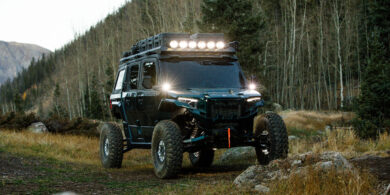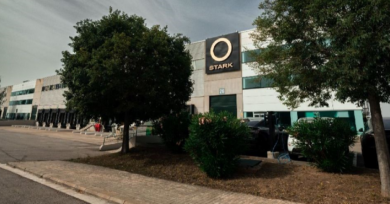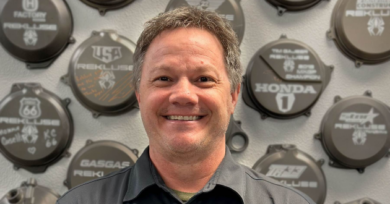May 14, 2007 – Blazing new trails
By Steve Bauer
Managing Editor
Although Sarah Schilke doesn’t view herself as a trailblazer, there’s no denying the lasting impact she has already made on the powersports industry.
Schilke grabbed headlines recently after being named to the Motorcycle Industry Council’s (MIC) board of directors. It marks the first time in the organization’s 37-year history that a woman has been elected to serve on the board.
Known to many in the industry as “Super Sarah,” both for her commitment to introducing women to motorcycling and for her passion for off-road racing, Schilke admits that becoming the first female board member in the history of the MIC is an intimidating process.
“All along this whole thing has been pretty scary,” said Schilke, the director of business development for Fairchild Sports/Hein Gericke, who will be representing the aftermarket/allied trades members on the MIC board.
“An analogy they use all the time for women motorcycle consumers is that going to a motorcycle dealership is intimidating, it’s like walking into a men’s locker room. In a way I’m a little bit nervous about this being the same experience for me. So it’s a little bit overwhelming, but at the same time I do feel that it’s important it’s happening. And it was kind of intimidating during the election process, as well, because I was up against all these people who have at least twice as much experience as I do in either the motorcycle industry or the business world in general.”
Schilke says her biggest motivator so far has been the outpouring of support and encouragement she’s received from industry members.
“I really had a lot of people contacting me saying that the industry needed something like this to shake things up and a lot of people gave me their vote of confidence in being a good voice for women and alternative markets,” she said. “So based on the whole situation and experience, I’ve realized that in a lot of people’s minds my appointment to the MIC board is extremely important.”
Tim Buche, president of the MIC, agrees that although all board members are dedicated to looking out for the best interests of those in the industry, Schilke’s election to the board brings with it a unique opportunity.
Recognizing the growth of women as riders and business leaders in the industry, Buche says there is a unique opportunity for Schilke to help all board members gain a better understanding of women motorcyclists and their impact on the industry.
“And a future with women riding more miles, developing more products and running more companies will be of benefit to the industry,” he added.
Unfamiliar Territory
Schilke’s election to the MIC board places her with a group that some in the industry view as shrouded in mystery and out of touch with current trends, a perception Schilke admits to sharing at one time herself. She believes her election to the board will help shed more light on the positive things the MIC does for the industry, and to help dispel any stereotypes people might have.
“I know that a lot of people feel that the MIC board is this ‘good old boys’ club,” she said. “It’s so shrouded in secrecy to a lot of people, and I think that’s exactly why it’s important I ran and was interested in doing it, just to have someone different on the board. And the election shows that a lot of people in the industry feel that way too.”
When asked how she plans to change any perceived attitudes board members might have, her answer is simple: education.
“One of the most critical things the industry is facing right now is the changing demographics as baby boomers either turn to scooters or just stop riding. We’re lacking the people to fill in that gap to keep the industry thriving,” she said. “And that’s something that I have targeted, because for the most part the people who are the ‘good old boys club’ aren’t really aware of new markets and different demographics, and if they are they don’t know how to attract them to motorcycling, I’ve also become really curious about Generation Y coming into the consumer base. So I know that’s something that’s been tossed around in Discover Today’s Motorcycling and MIC meetings. So for me it was like a light bulb going off when I thought that is something I could put my arms around, am knowledgeable about it and can share that with the people who are scrambling to figure out what to do.”
Buche agrees with Schilke that the board is attempting to be proactive, both with trends coming from the Generation Y sector and also women riders. But he argues that anyone who has any negative opinions of the MIC and the board isn’t involved enough to appreciate all that the MIC does for its members.
“I would say that people who don’t attend events like our board meetings, which are open to all MIC members, might look at the MIC from a distance and have a negative opinion of the organization,” he said. “Those who understand what we do, however, feel that our board members are very committed to promote, protect and preserve our industry. I would encourage any members who don’t participate in things like board and committee meetings to start doing so to have a better appreciation of the investment of their dues on behalf of the industry.”
A Misunderstood Market
When asked how much impact a female voice can have on the MIC board, Schilke was quick to point out that female motorcyclists are a relatively untapped market, and that having a woman’s perspective on the board will help provide a guide for the industry to cater to them.
“First, women are confusing to men, and I think it’s really easy for them to ignore what little of a women’s voice there is, because it’s confusing and it takes work,” she said. “With me being there, I can present a voice that represents women motorcyclists in general and potential women motorcyclists.”
When asked if she believes the industry does enough to cater to the female market, her answer was clear.
“Absolutely not, I don’t think the industry does enough to cater to women, because I think it’s still a new, uncomfortable market in a lot of ways,” she explained. “I think there should be a lot more done, because I know from my personal experiences that there are a lot of women out there who dream about riding. They want to ride; they just don’t know how to go about it, they’re too intimidated. But I really don’t think that the way to address that is to go in and force the issue. It’s a lot bigger issue than just not addressing women well enough. With anything else it’s going to continue to be a slow process, and one of the first stepping stones is to create a lot of awareness that there are women out there who want to ride, and also that there are a lot of women who are already riding who use a lot of different methods to purchase items, to get their bikes repaired, to get coaching on the race track. They’re using these alternate channels because of that locker room effect.”
Schilke is the first to point out, however, that she isn’t there to force her ideas to the board, and that she has much to learn about how the MIC board conducts business and where she fits into the process.
“I certainly don’t want to walk in there and say, ‘Hey, now that I’m here this is the way things are going to be done from now on,’” she said. “I don’t think that bulldogging my way in there is going to be very effective and I do think that in order for my voice to be heard and for my opinions to have an effect, it has to be presented in a way that matches the scenario and audience. I do think it’s going to be, primarily in the first meeting, a huge learning experience for me. But I’m definitely not afraid of piping up and speaking my mind when necessary. It is a pretty overwhelming feat, but I’m really excited about the challenge.”




